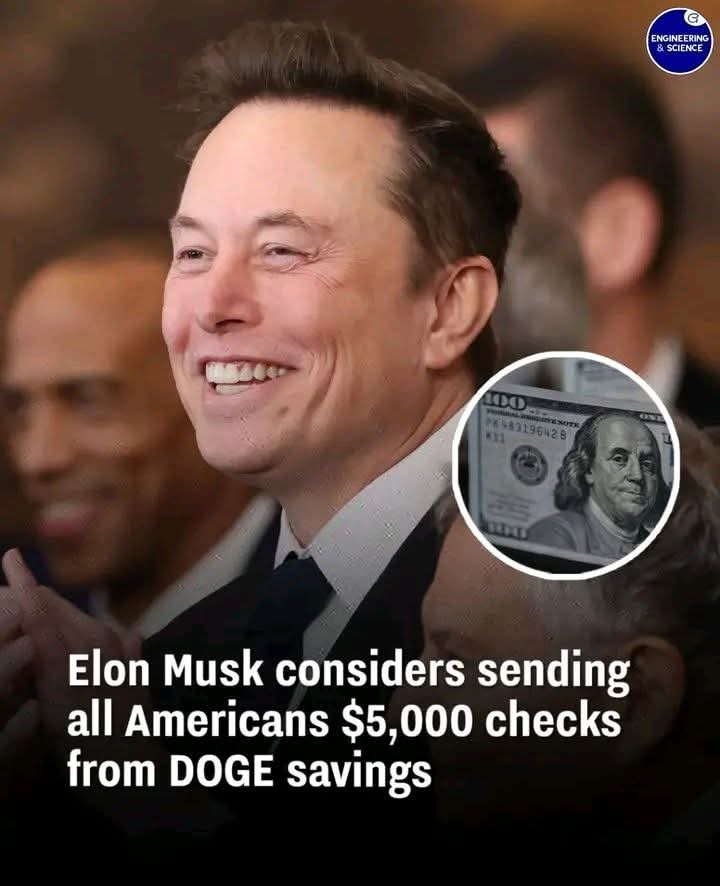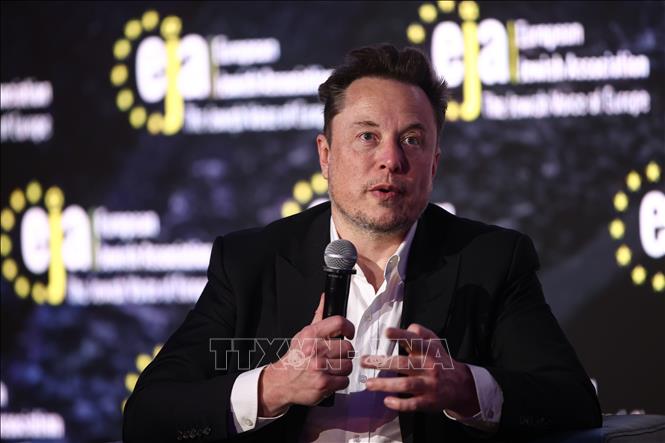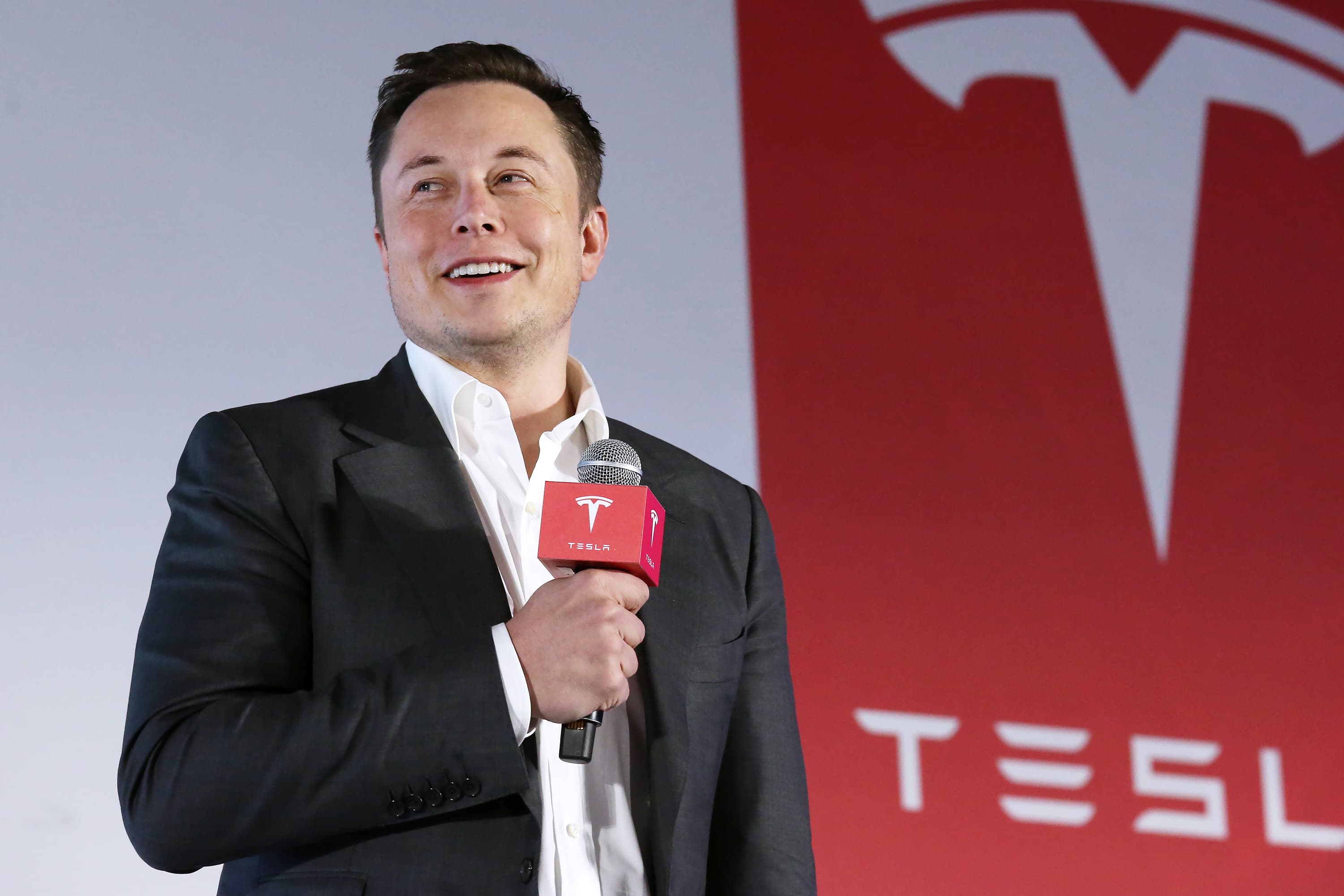BREAKING NEWS: Elon Musk is considering distributing $5,000 checks to all Americans using Dogecoin (DOGE) savings, sparking widespread excitement and speculation…

While there is no official confirmation, Musk’s long-standing support for cryptocurrency, blockchain technology.
And financial innovation continues to drive discussions about the future of decentralized finance (DeFi) and crypto-based universal basic income (UBI).
If such an initiative were real, it could revolutionize financial systems, accelerate cryptocurrency adoption, and redefine wealth distribution. However, investors and crypto enthusiasts should verify facts before acting on viral news.
In an unprecedented move that has sent shockwaves through the financial world, Elon Musk, the enigmatic CEO of Tesla and SpaceX, is reportedly contemplating a groundbreaking initiative.
This bold proposal involves the distribution of $5,000 checks to every American citizen, funded entirely through his substantial Dogecoin (DOGE) holdings.
The announcement has ignited a firestorm of excitement, speculation, and debate across social media, financial markets, and mainstream news outlets.
The idea, which surfaced in a cryptic tweet from Musk himself, suggests a radical departure from traditional economic stimulus measures.
Unlike conventional government-backed financial aid, this proposal hinges on the volatile yet increasingly popular cryptocurrency, Dogecoin.
Known for its origins as a meme-inspired digital currency, Dogecoin has grown into a significant player in the crypto market, largely due to Musk’s vocal support and occasional market-moving tweets.

Musk’s proposal comes at a time when the United States is grappling with economic challenges exacerbated by the COVID-19 pandemic.
With unemployment rates fluctuating and small businesses struggling to stay afloat, the notion of a substantial financial infusion has been met with both enthusiasm and skepticism.
Critics argue that relying on a cryptocurrency known for its price volatility could introduce unpredictable risks, while supporters view it as a bold step towards embracing digital currencies in mainstream finance.
The feasibility of such a plan raises numerous questions. Foremost among them is the logistics of distributing Dogecoin, a cryptocurrency that operates on a decentralized blockchain network.
Unlike fiat currency, which is controlled by central banks and distributed through established financial institutions, Dogecoin transactions occur peer-to-peer without intermediaries.
This raises concerns about how the distribution would be managed, especially considering the potential technical challenges and security risks associated with handling such a large-scale cryptocurrency transfer.
Moreover, the environmental impact of Dogecoin cannot be overlooked.
While Bitcoin, the most well-known cryptocurrency, has faced significant criticism for its energy-intensive mining process, Dogecoin’s proof-of-work algorithm also consumes a considerable amount of electricity.
Musk, who has previously expressed concerns about the environmental footprint of cryptocurrencies, would need to address these issues to garner broader support for his initiative.
The announcement has also sparked a flurry of activity within the cryptocurrency community. Dogecoin’s value saw an immediate surge following Musk’s tweet, reflecting the market’s reaction to the potential influx of demand.
Investors and traders are closely monitoring the situation, aware that Musk’s influence can significantly impact cryptocurrency prices.
This volatility underscores the speculative nature of the crypto market, where public figures’ endorsements can lead to rapid price fluctuations.
Economic experts are divided on the potential long-term effects of such a distribution. Some argue that injecting $5,000 per citizen could stimulate consumer spending, potentially boosting the economy in the short term.
Increased spending could lead to higher demand for goods and services, encouraging businesses to hire more employees and invest in growth. However, others warn of the risks associated with relying on a cryptocurrency whose value can fluctuate dramatically.
The potential for rapid depreciation could leave recipients with significantly less value than initially received, undermining the intended economic stimulus.

Political reactions to Musk’s proposal have been mixed. Some lawmakers have expressed interest in exploring the idea further, recognizing the potential benefits of a direct financial injection to citizens. Others have raised concerns about the lack of regulatory oversight in the cryptocurrency space.
The absence of a centralized authority governing cryptocurrencies like Dogecoin means that traditional financial safeguards are not in place, potentially exposing recipients to fraud and market manipulation.
The proposal has also reignited the debate over wealth distribution and economic inequality. Musk, one of the wealthiest individuals in the world, has often been at the center of discussions about wealth concentration and philanthropy.
His suggestion to use his Dogecoin holdings for such a distribution aligns with his previous statements about using his resources to address societal challenges.
However, it also raises questions about the role of private wealth in public welfare and the ethics of using volatile assets for significant financial distributions.
In the tech community, reactions have been largely positive, with many viewing the proposal as a forward-thinking approach to economic stimulus.
Tech enthusiasts and cryptocurrency advocates see it as an opportunity to showcase the practical applications of digital currencies in everyday life.
They argue that such an initiative could increase public awareness and acceptance of cryptocurrencies, potentially paving the way for broader adoption in the future.
However, the proposal is not without its detractors. Financial regulators and traditional economists have expressed concerns about the stability and reliability of using cryptocurrency for such a large-scale financial initiative.
They argue that the inherent volatility of cryptocurrencies could lead to unforeseen economic consequences, potentially destabilizing the financial system.
Additionally, the lack of regulatory frameworks governing cryptocurrencies adds another layer of complexity to the proposal.
The announcement has also prompted a closer look at Musk’s personal financial situation.
With a significant portion of his wealth tied up in Tesla stock and his growing Dogecoin holdings, the feasibility of liquidating such assets to fund the distribution is under scrutiny.
Analysts are evaluating the potential impact on Tesla’s stock price and the overall market if Musk were to sell a substantial amount of his holdings to finance the initiative.
As the debate continues, one thing is clear: Musk’s proposal has captured the public’s imagination.
Social media platforms are abuzz with discussions, memes, and theories about the potential outcomes. The idea of receiving $5,000 in cryptocurrency has sparked a mix of excitement, curiosity, and caution among Americans.
Many are eager to see how this unprecedented plan will unfold, while others remain skeptical about its practicality and potential risks.
In conclusion, Elon Musk’s proposal to distribute $5,000 checks to all Americans using his Dogecoin savings is a bold and controversial idea that has sparked widespread discussion.
While it presents an innovative approach to economic stimulus, it also raises significant questions about feasibility, stability, and regulatory oversight.
As the world watches closely, the outcome of this proposal could have far-reaching implications for the future of cryptocurrency in mainstream finance and the role of private wealth in public welfare.
News
BREAKING: Lily Collins’ EMOTIONAL 36th Birthday—‘First as a Mama!’ Shares RARE Photos of Baby Tove & Husband Charlie!
Lily Collins celebrated her ‘first birthday as a mama’ as she turned 36 on Tuesday – and shared sweet family snaps…
BREAKING: White Lotus Star Alexandra Daddario TURNS HEADS at Australian Grand Prix—VIP Photos LEAKED
Alexandra Daddario flaunted her luxurious life at the Formula One Grand Prix in Melbourne. The White Lotus star, 39, was pictured on the grid…
I’m Convinced Alexandra Daddario Is The Perfect Casting Choice To Play Wonder Woman In James Gunn’s DCU
Alexandra Daddario has all the needed elements to bring Wonder Woman to life in the new DC Universe and make her performance as memorable…
Zoe Saldaña Says Oscars Rejecting ‘Avatar’ Acting Is ‘Quite Deflating’: ‘You’re Overlooked and Then Minimized and Completely Disregarded’
Zoe Saldaña, the acclaimed actress known for her roles in blockbuster franchises like Avatar and Guardians of the Galaxy, has never been one…
BREAKING: Zoe Saldaña’s FORGOTTEN Ballet Movie DESTROYS Her Oscar Role—Fans SCREAM ‘This Is Her REAL Masterpiece!’
Emilia Pérez is not the first time Zoe Saldaña has danced on screen, and her ballet performance in Center Stage showcased her musical…
BREAKING: Pixar’s NEW Movie Trailer LEAKED—Starring Oscar-Winning SUPERSTAR! Fans SCREAM ‘BEST ANIMATION EVER!’
After winning the Oscar for Best Supporting Actress for her performance in Emilia Pérez, Zoe Saldaña’s next movie will be the Pixar sci-fi movie Elio….
End of content
No more pages to load












